
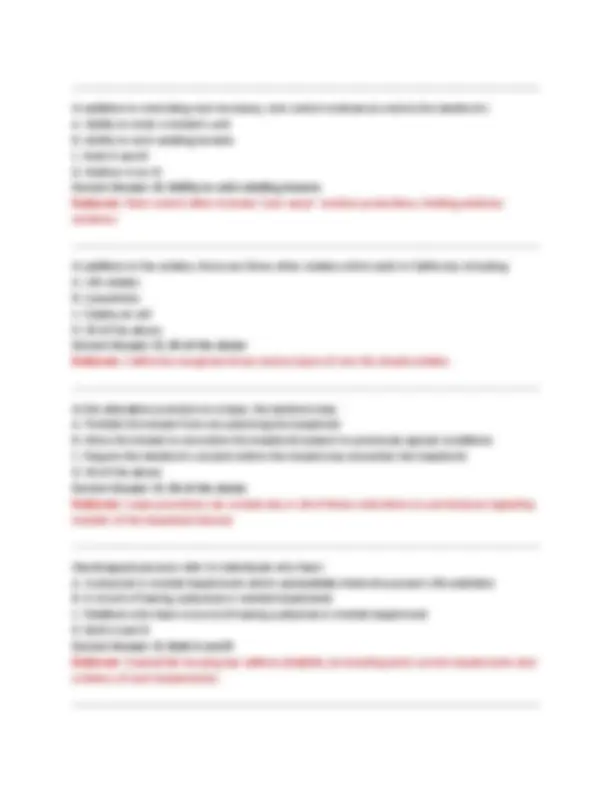
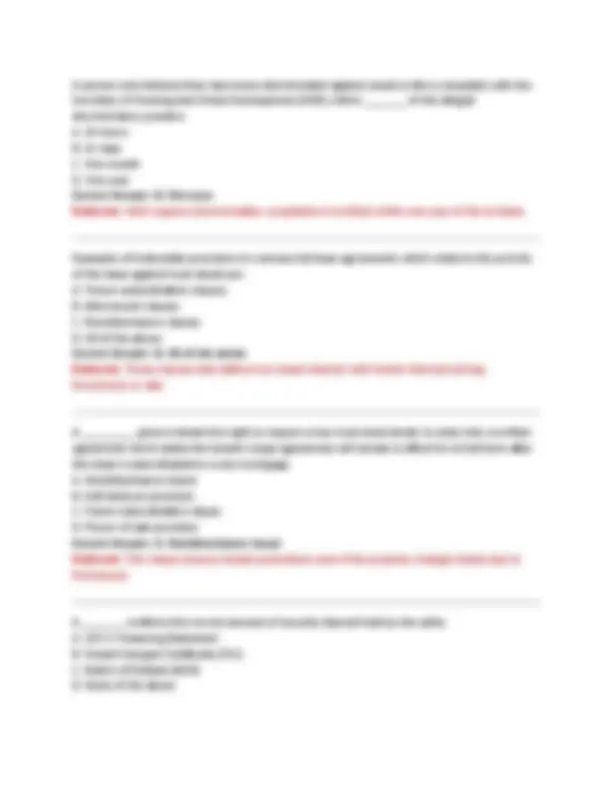
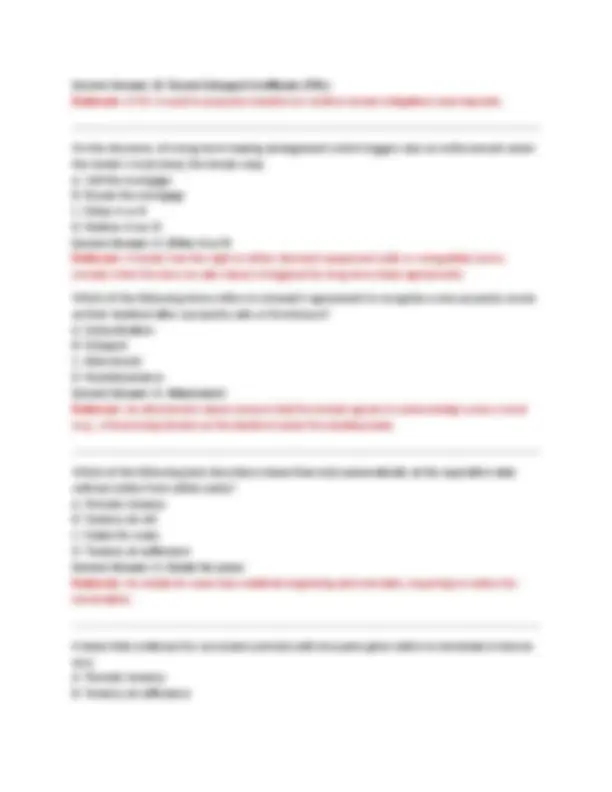
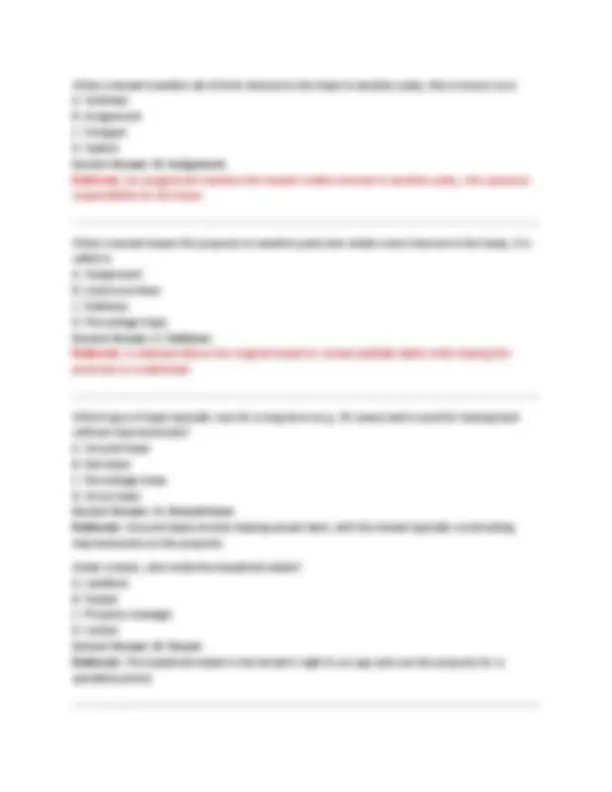
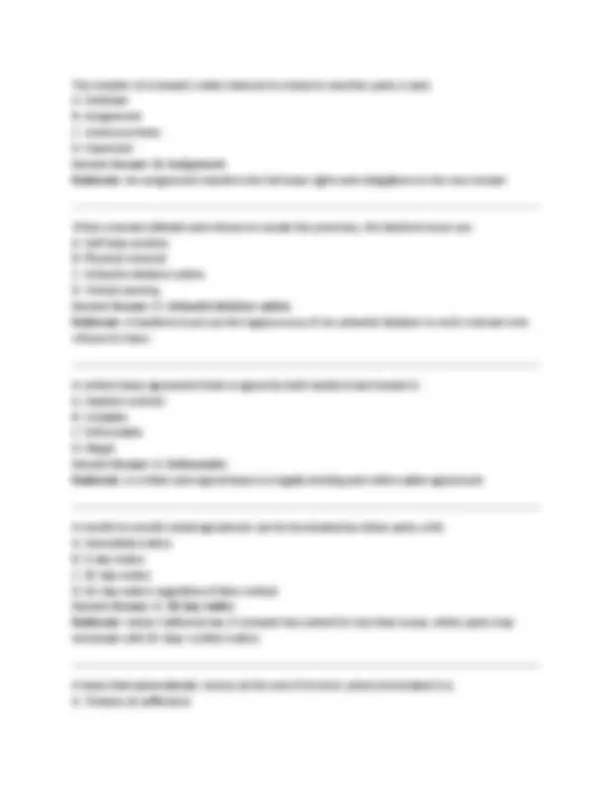
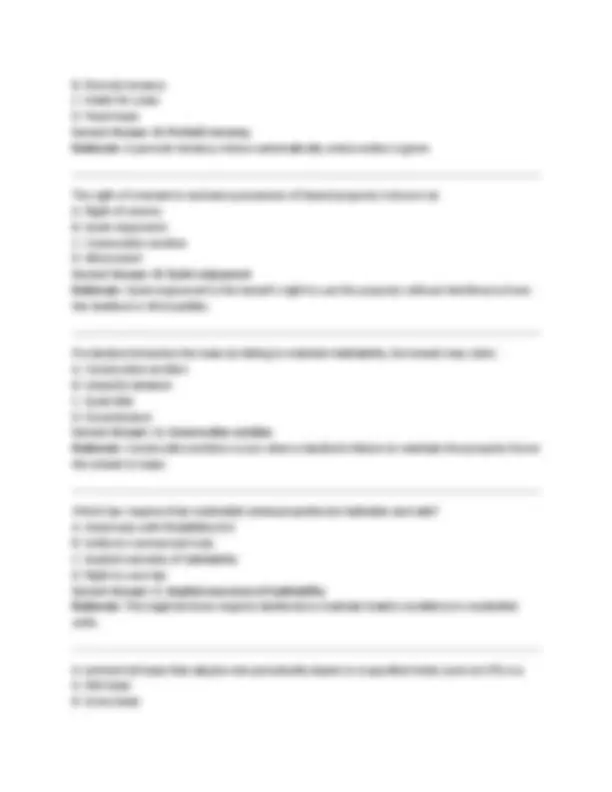
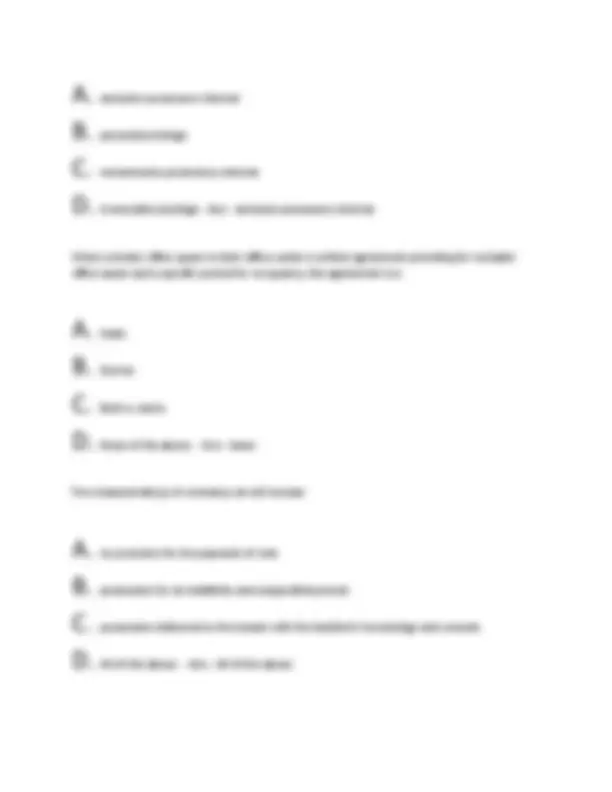

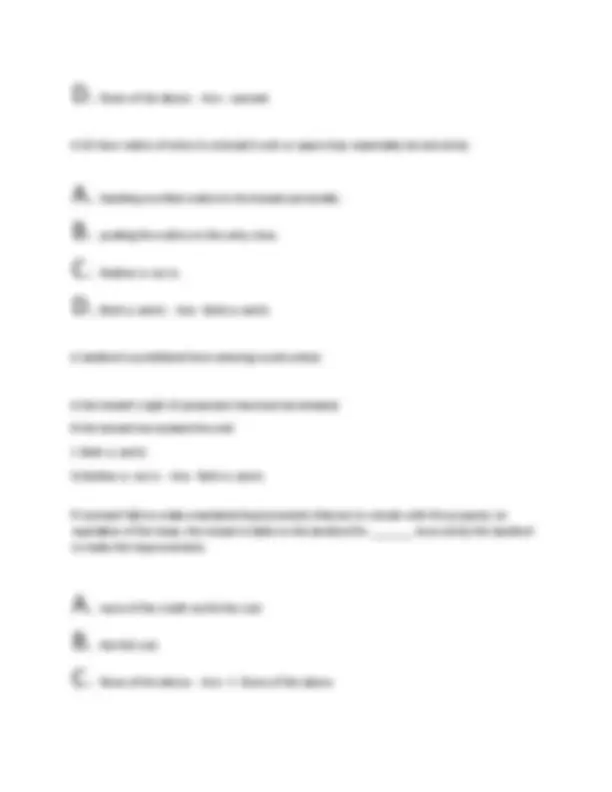

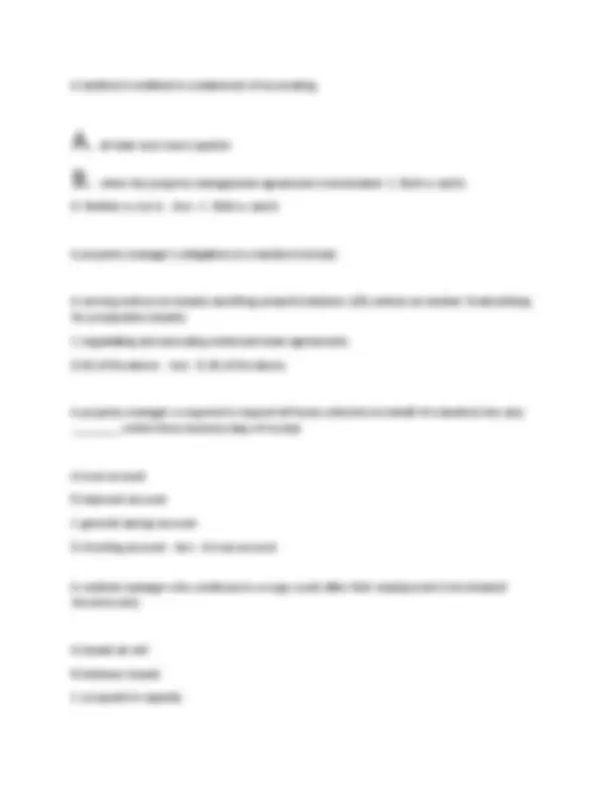
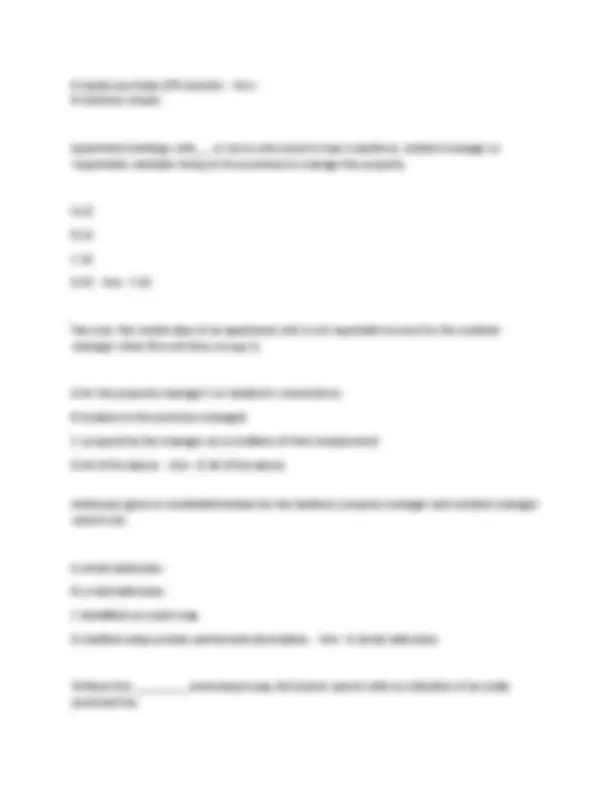
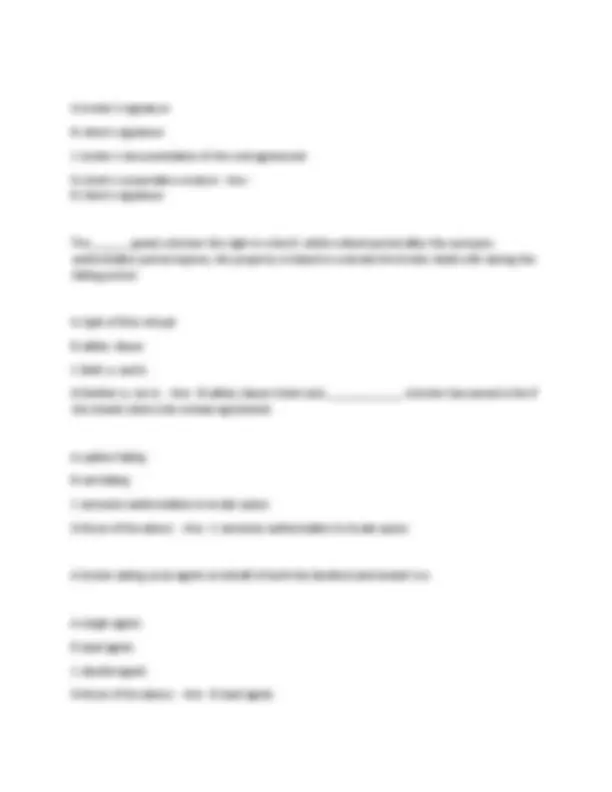

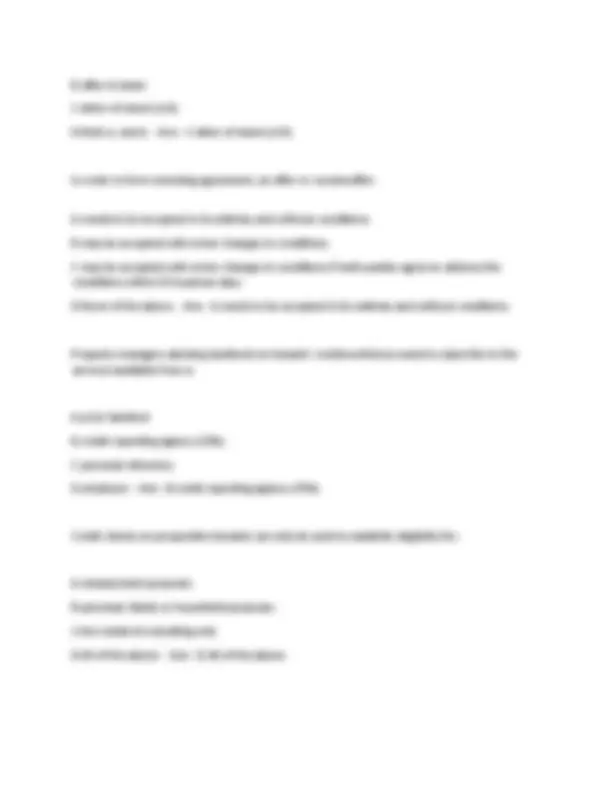
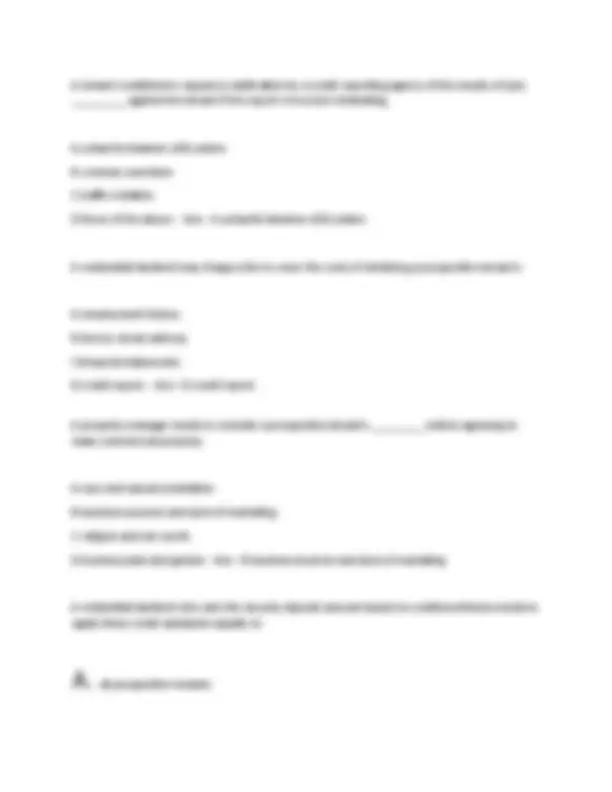
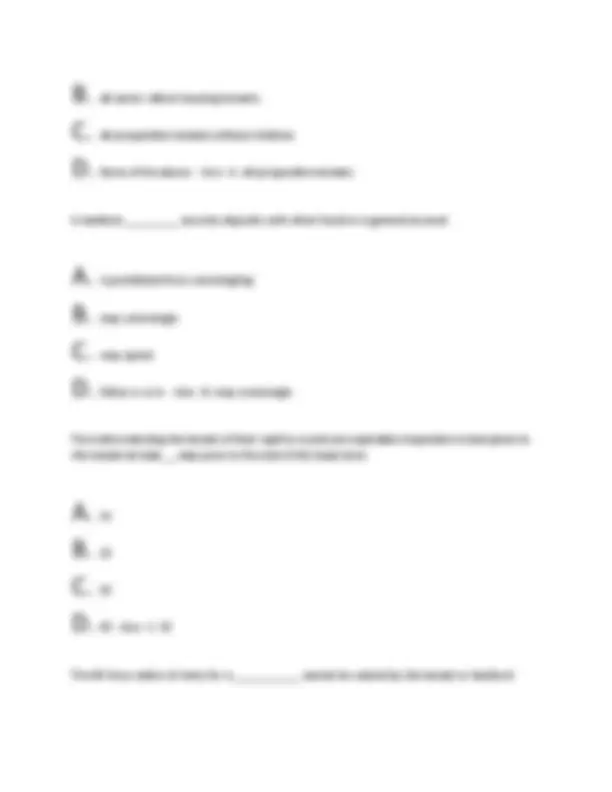
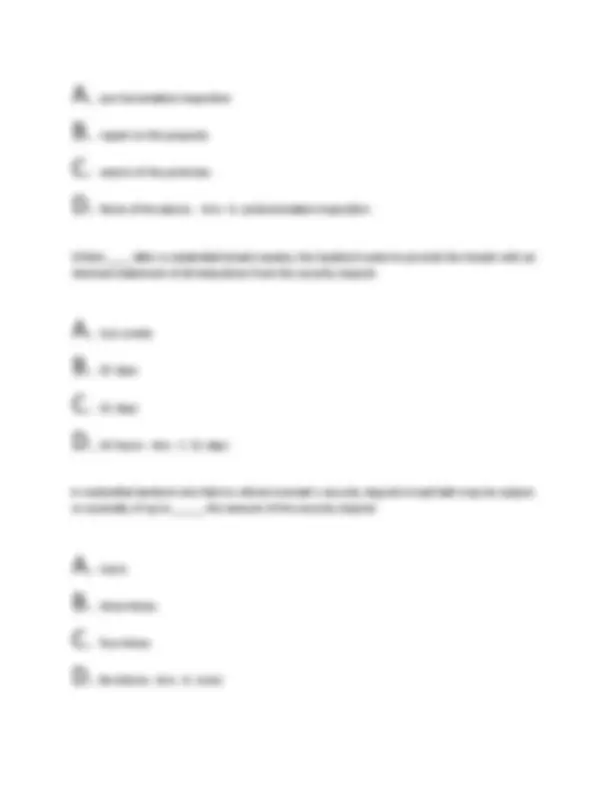

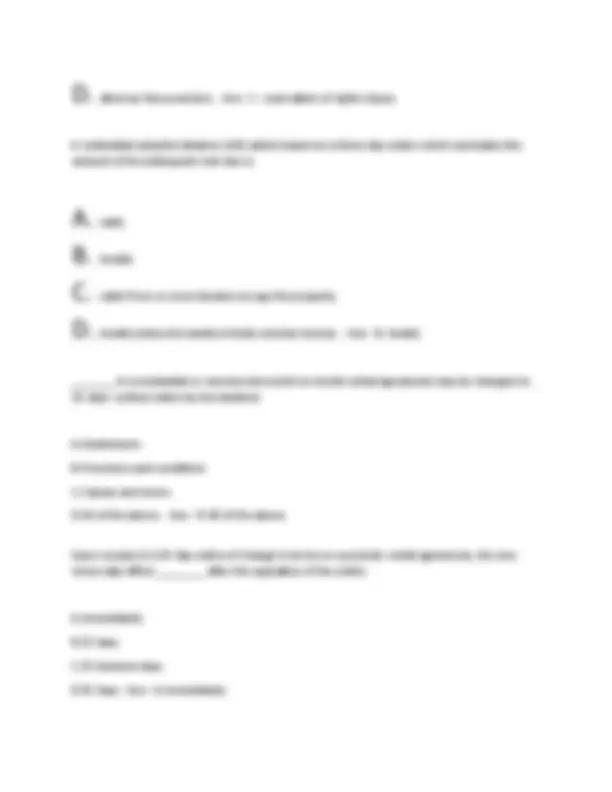
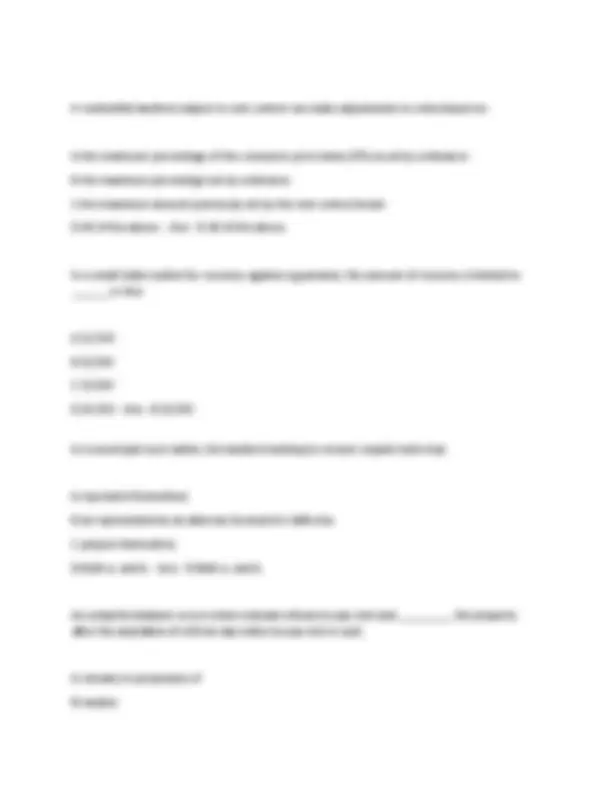

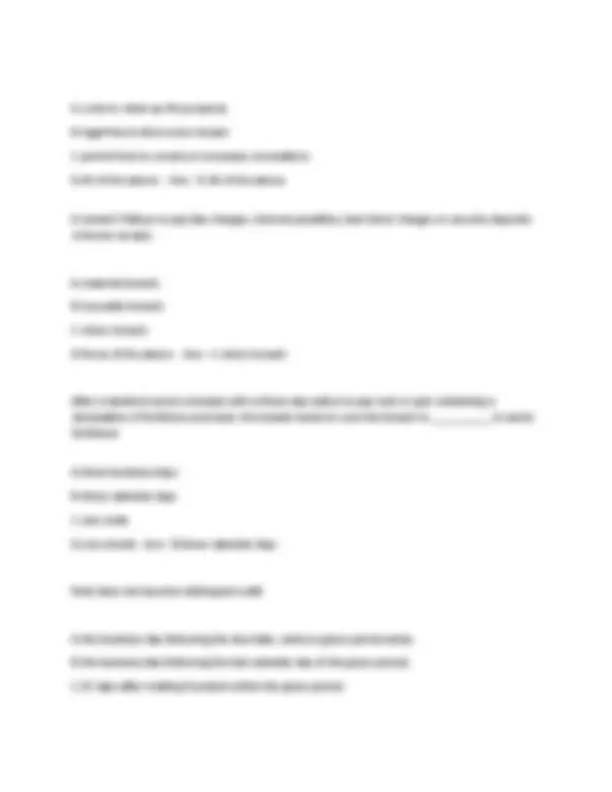

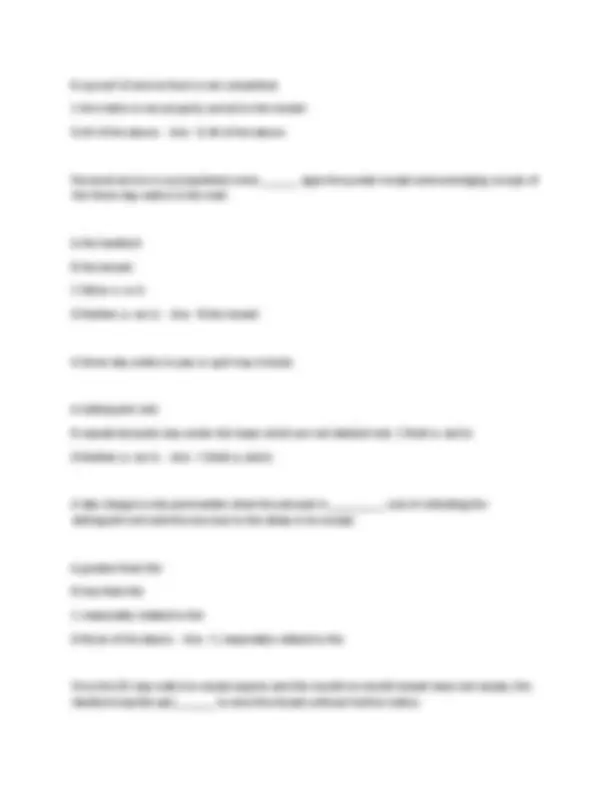

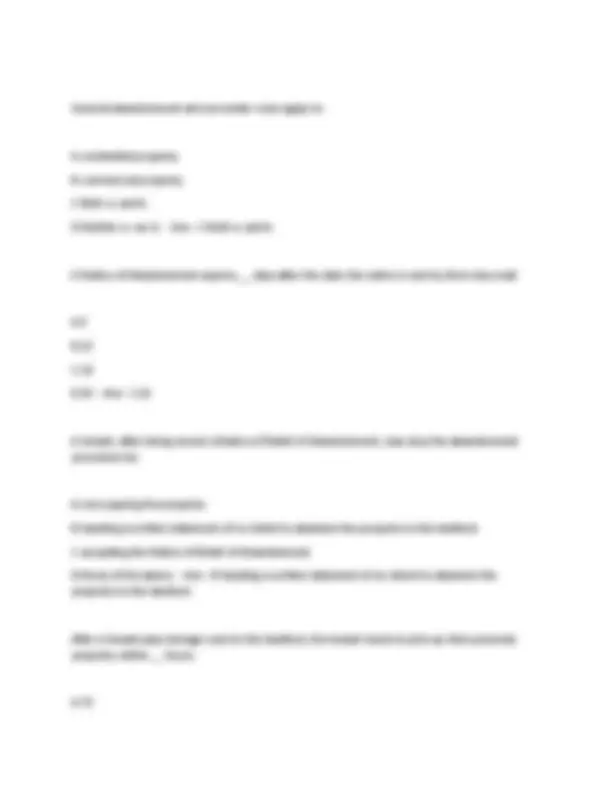
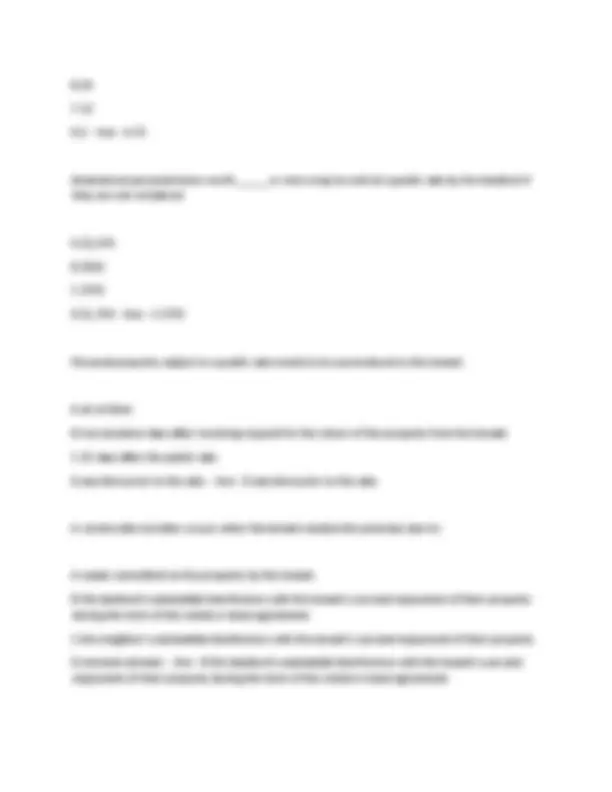

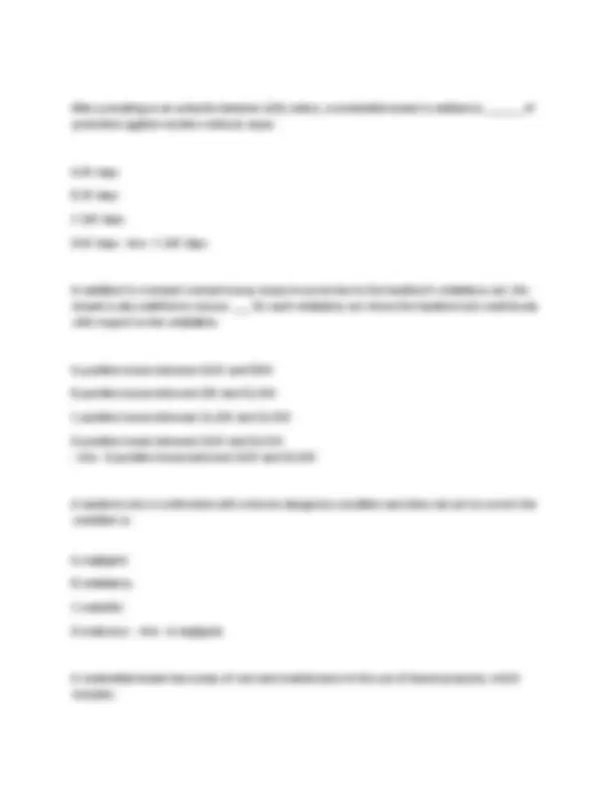
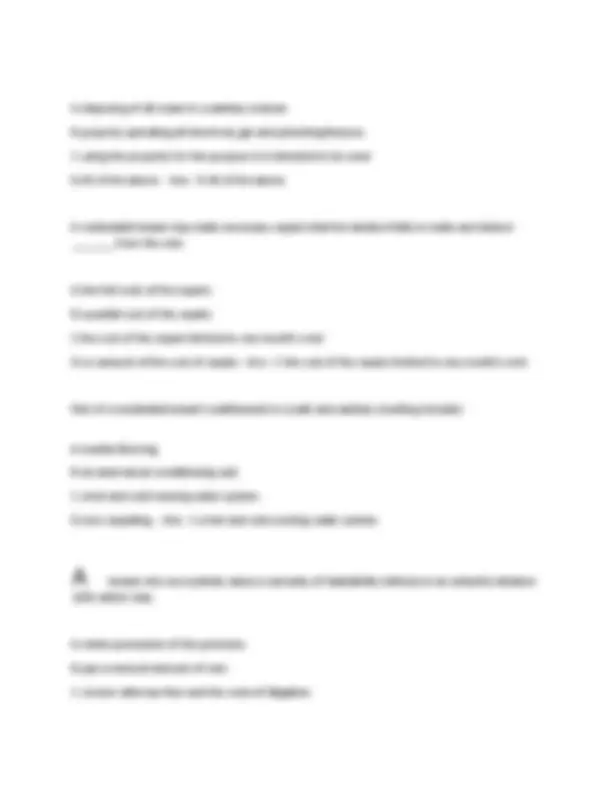

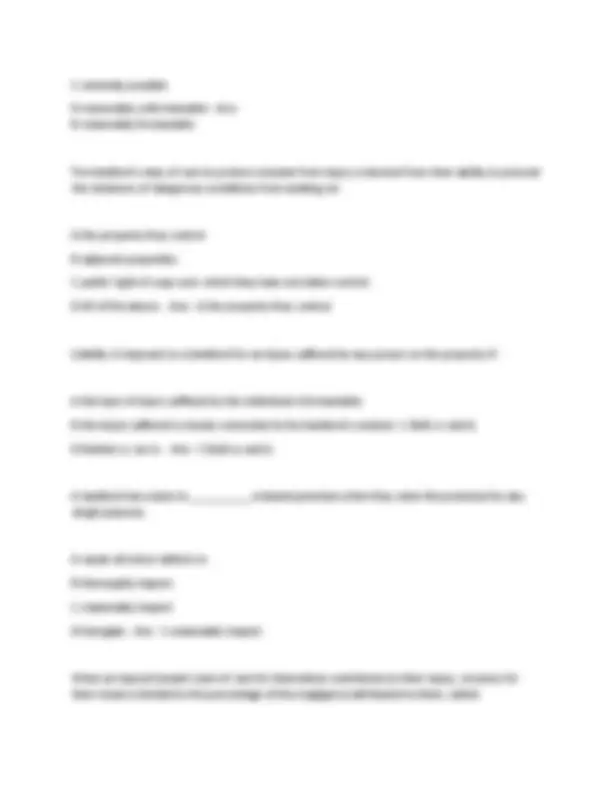



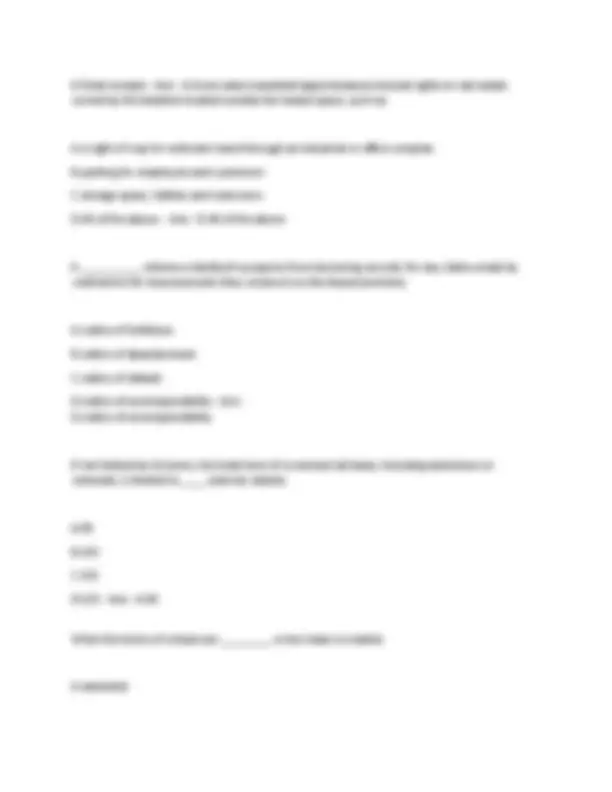
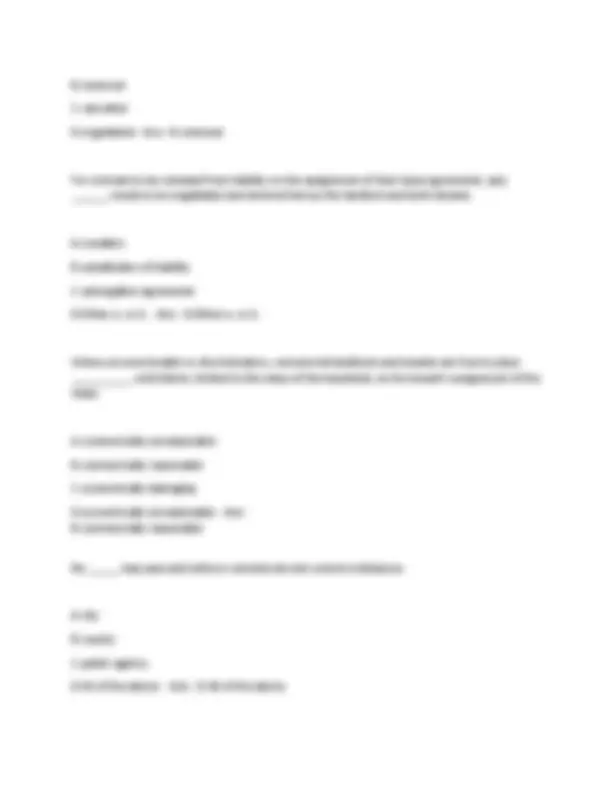
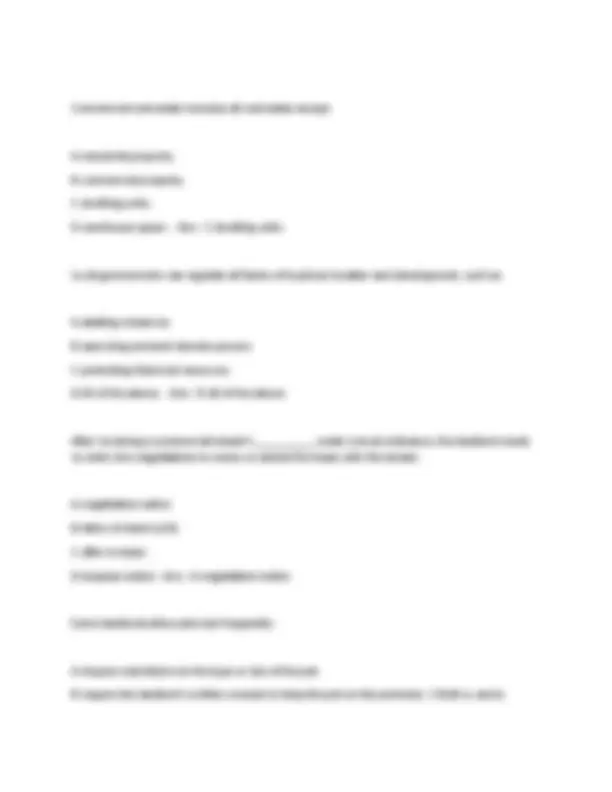

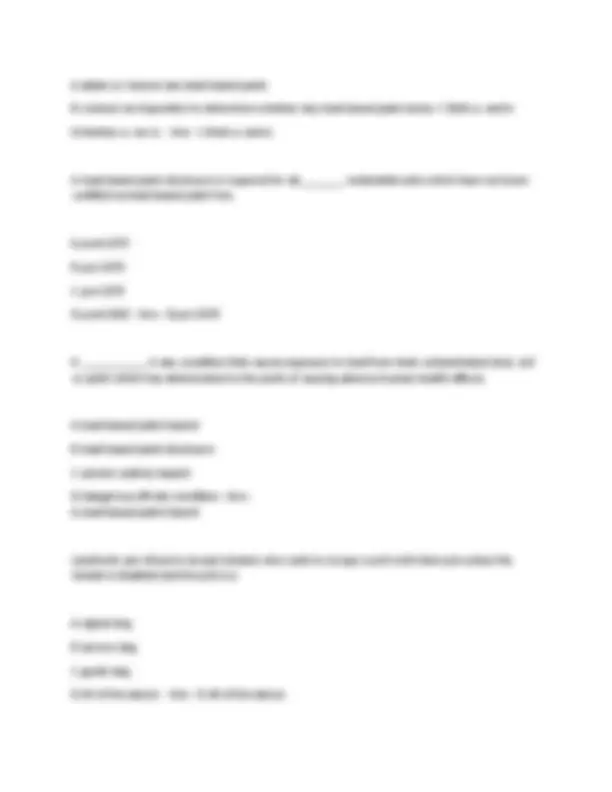
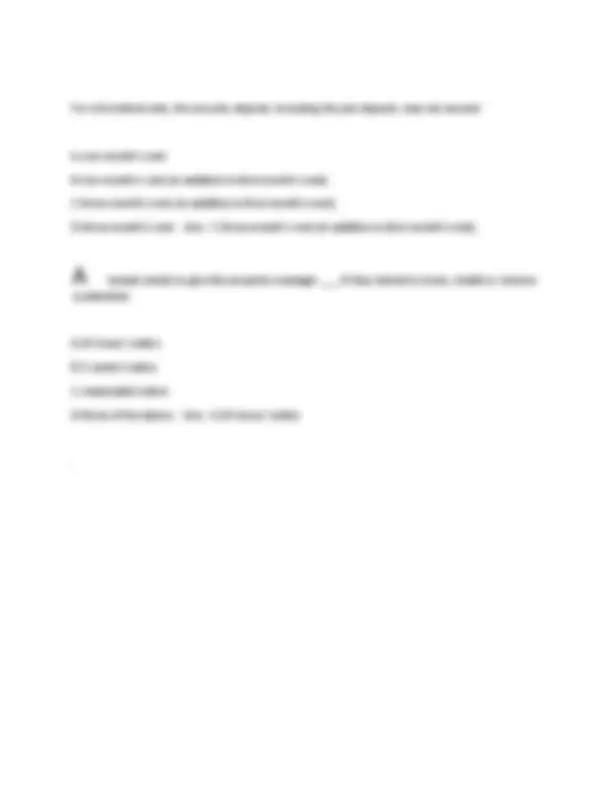


Study with the several resources on Docsity

Earn points by helping other students or get them with a premium plan


Prepare for your exams
Study with the several resources on Docsity

Earn points to download
Earn points by helping other students or get them with a premium plan
Community
Ask the community for help and clear up your study doubts
Discover the best universities in your country according to Docsity users
Free resources
Download our free guides on studying techniques, anxiety management strategies, and thesis advice from Docsity tutors
A broker found guilty of discrimination by the Secretary of Housing and Urban Development (HUD) may face disciplinary action from the: A. California Department of Real Estate (DRE) B. Local police department C. Department of Motor Vehicles (DMV) D. All of the above Correct Answer: A. California Department of Real Estate (DRE) Rationale: The DRE has the authority to discipline real estate licensees for violations, including discriminatory practices. A landlord of newly constructed ________ unit residential property needs to provide disabled access. A. Four or more B. Four or less C. Eight or more D. Twelve or more Correct Answer: A. Four or more Rationale: Under the Fair Housing Act, newly constructed multifamily dwellings with four or more units must be accessible to persons with disabilities.
Typology: Exams
1 / 50

This page cannot be seen from the preview
Don't miss anything!











































A broker found guilty of discrimination by the Secretary of Housing and Urban Development (HUD) may face disciplinary action from the: A. California Department of Real Estate (DRE) B. Local police department C. Department of Motor Vehicles (DMV) D. All of the above Correct Answer: A. California Department of Real Estate (DRE) Rationale: The DRE has the authority to discipline real estate licensees for violations, including discriminatory practices. A landlord of newly constructed ________ unit residential property needs to provide disabled access. A. Four or more B. Four or less C. Eight or more D. Twelve or more Correct Answer: A. Four or more Rationale: Under the Fair Housing Act, newly constructed multifamily dwellings with four or more units must be accessible to persons with disabilities. Rental policies excluding children under the age of 18 are considered ________ unless the property qualifies as senior citizen housing. A. Reasonable B. Unlawful discrimination C. Lawful discrimination D. None of the above Correct Answer: B. Unlawful discrimination Rationale: Familial status is a protected class under fair housing laws; excluding children is discriminatory unless the property is designated for senior housing.
Requiring families with children to ________ than other prospective tenants when screening rental applications is prohibited. A. Have a higher family income B. Pay a higher security deposit C. Have a better credit rating D. All of the above Correct Answer: D. All of the above Rationale: Disparate treatment of families with children in rental screening is a violation of fair housing laws. Senior citizen housing is property: A. Intended for occupancy only by individuals 62 years of age or older B. Intended for occupancy by at least one person of 55 years of age or older C. Both A and B D. Neither A nor B Correct Answer: C. Both A and B Rationale: Senior housing can meet the requirements under either provision of the Housing for Older Persons Act (HOPA). A senior citizen and their disabled _________ may live in senior citizen housing. A. Child B. Grandchild C. Both A and B D. Neither A nor B Correct Answer: C. Both A and B Rationale: Exceptions exist in senior housing laws to allow for disabled children or grandchildren to live with the senior resident. Two primary types of rent control ordinances exist, called: A. Strict rent control and variable rent control B. Market rent control and vacancy decontrol C. Vacancy decontrol and strict rent control D. Variable rent control and market rent control Correct Answer: C. Vacancy decontrol and strict rent control Rationale: These are the two main regulatory methods cities use to control rents.
A person who believes they have been discriminated against needs to file a complaint with the Secretary of Housing and Urban Development (HUD) within _______ of the alleged discriminatory practice. A. 24 hours B. 12 days C. One month D. One year Correct Answer: D. One year Rationale: HUD requires discrimination complaints to be filed within one year of the incident. Examples of boilerplate provisions in commercial lease agreements which relate to the priority of the lease against trust deeds are: A. Future subordination clauses B. Attornment clauses C. Nondisturbance clauses D. All of the above Correct Answer: D. All of the above Rationale: These clauses help define how leases interact with lender interests during foreclosure or sale. A _________ gives a tenant the right to require a new trust deed lender to enter into a written agreement which states the tenant's lease agreement will remain in effect for its full term after the lease is subordinated to a new mortgage. A. Nondisturbance clause B. Self-destruct provision C. Future subordination clause D. Power of sale provision Correct Answer: A. Nondisturbance clause Rationale: This clause ensures tenant protections even if the property changes hands due to foreclosure. A _______ confirms the correct amount of security deposit held by the seller. A. UCC-1 Financing Statement B. Tenant Estoppel Certificate (TEC) C. Notice of Default (NOD) D. None of the above
Correct Answer: B. Tenant Estoppel Certificate (TEC) Rationale: A TEC is used in property transfers to confirm tenant obligations and deposits. On the discovery of a long-term leasing arrangement which triggers due-on enforcement under the lender's trust deed, the lender may: A. Call the mortgage B. Recast the mortgage C. Either A or B D. Neither A nor B Correct Answer: C. Either A or B Rationale: A lender has the right to either demand repayment (call) or renegotiate terms (recast) when the due-on-sale clause is triggered by long-term lease agreements Which of the following terms refers to a tenant’s agreement to recognize a new property owner as their landlord after a property sale or foreclosure? A. Subordination B. Estoppel C. Attornment D. Nondisturbance Correct Answer: C. Attornment Rationale: An attornment clause ensures that the tenant agrees to acknowledge a new owner (e.g., a foreclosing lender) as the landlord under the existing lease. Which of the following best describes a lease that ends automatically at the expiration date without notice from either party? A. Periodic tenancy B. Tenancy at will C. Estate for years D. Tenancy at sufferance Correct Answer: C. Estate for years Rationale: An estate for years has a definite beginning and end date, requiring no notice for termination. A lease that continues for successive periods until one party gives notice to terminate is known as a: A. Periodic tenancy B. Tenancy at sufferance
B. Industrial warehouses C. Retail businesses D. Government buildings Correct Answer: C. Retail businesses Rationale: Percentage leases are typically used in retail, where rent is based on a percentage of the tenant’s gross sales. In a gross lease, the landlord typically pays for: A. Property taxes B. Insurance C. Maintenance D. All of the above Correct Answer: D. All of the above Rationale: A gross lease means the landlord covers property expenses, while the tenant pays a fixed rent amount. Which lease provision protects a commercial tenant from being evicted if the property is sold or foreclosed? A. Attornment clause B. Nondisturbance clause C. Subordination clause D. Reversionary clause Correct Answer: B. Nondisturbance clause Rationale: This clause ensures the tenant’s right to occupy the property remains intact even after foreclosure or sale. A lease that allows the tenant to purchase the property during or at the end of the lease term is called a: A. Sale-leaseback B. Lease-option C. Ground lease D. Graduated lease Correct Answer: B. Lease-option Rationale: A lease-option gives the tenant the right, but not the obligation, to buy the property under agreed terms.
When a tenant transfers all of their interest in the lease to another party, this is known as a: A. Sublease B. Assignment C. Estoppel D. Option Correct Answer: B. Assignment Rationale: An assignment transfers the tenant’s entire interest to another party, who assumes responsibility for the lease. When a tenant leases the property to another party but retains some interest in the lease, it is called a: A. Assignment B. Lease-purchase C. Sublease D. Percentage lease Correct Answer: C. Sublease Rationale: A sublease allows the original tenant to remain partially liable while leasing the premises to a subtenant. Which type of lease typically runs for a long term (e.g., 50 years) and is used for leasing land without improvements? A. Ground lease B. Net lease C. Percentage lease D. Gross lease Correct Answer: A. Ground lease Rationale: Ground leases involve leasing vacant land, with the tenant typically constructing improvements on the property Under a lease, who holds the leasehold estate? A. Landlord B. Tenant C. Property manager D. Lender Correct Answer: B. Tenant Rationale: The leasehold estate is the tenant’s right to occupy and use the property for a specified period.
B. Periodic tenancy C. Estate for years D. Fixed lease Correct Answer: B. Periodic tenancy Rationale: A periodic tenancy renews automatically unless notice is given. The right of a tenant to exclusive possession of leased property is known as: A. Right of reentry B. Quiet enjoyment C. Constructive eviction D. Attornment Correct Answer: B. Quiet enjoyment Rationale: Quiet enjoyment is the tenant’s right to use the property without interference from the landlord or third parties. If a landlord breaches the lease by failing to maintain habitability, the tenant may claim: A. Constructive eviction B. Unlawful detainer C. Quiet title D. Encumbrance Correct Answer: A. Constructive eviction Rationale: Constructive eviction occurs when a landlord’s failure to maintain the property forces the tenant to leave. Which law requires that residential rental properties be habitable and safe? A. Americans with Disabilities Act B. Uniform Commercial Code C. Implied warranty of habitability D. Right to cure law Correct Answer: C. Implied warranty of habitability Rationale: This legal doctrine requires landlords to maintain livable conditions in residential units. A commercial lease that adjusts rent periodically based on a specified index (such as CPI) is a: A. Net lease B. Gross lease
C. Percentage lease D. Index lease Correct Answer: D. Index lease Rationale: An index lease links rent adjustments to a measurable economic index, such as the Consumer Price Index. The due-on clause is triggered when an owner of property secured by a due-on trust deed enters into a lease: A.with a term over two years or an option to purchase. B.with a term under three years without an option to purchase. C.with a term over three years or an option to purchase. D.with a term under two years without an option to purchase. - Ans - C.with a term over three years or an option to purchase. A broker who advises a buyer not to disclose a sale to a lender secured by a trust deed on the property may be held liable by the _______ for their right to additional interest. A.buyer B.lender C.seller D.All of the above. - Ans - B.lender Residential tenants whose month-to-month rental agreements were junior to the recording of the trust deed, and thus eliminated by the foreclosure sale, are entitled to a ________ written notice to vacate. A.three-day
D.one-year - Ans - C.90-day
When a broker offers space in their office under a written agreement providing for lockable office space and a specific period for occupancy, the agreement is a:
The characteristic(s) of a tenancy-at-will include:
A tenant-at-sufferance is also known as a(n):
When a landlord accepts rent from a holdover tenant after a fixed-term tenancy expires, the expired lease agreement is _____ on the same terms except for the period of occupancy.
A landlord may not permit the police to enter and search a tenant's unit without a:
Tenant improvements become part of the leased property and remain with the property on expiration of the lease unless:
_______ revert(s) to the landlord on expiration of the lease.
A(n) ________ is a preemptive right to purchase property if the owner later decides to sell the property.
When options to renew or extend a lease are included in the lease terms, the expiration of the option to buy is tied to:
The tenant's right of first refusal is ________ when the landlord agrees to sell the property on terms different from those terms offered to the tenant.
A temporary manager of real estate who has __________ is not required to hold a real estate broker's license.
A landlord is entitled to a statement of accounting:
D. Neither a. nor b. - Ans - C. Both a. and b. A property manager's obligations to a landlord include: A.serving notices on tenants and filing unlawful detainer (UD) actions as needed. B.advertising for prospective tenants. C.negotiating and executing rental and lease agreements. D.All of the above. - Ans - D.All of the above. A property manager is required to deposit all funds collected on behalf of a landlord into a(n) ________ within three business days of receipt. A.trust account B.impound account C.general savings account D.checking account - Ans - A.trust account A resident manager who continues to occupy a unit after their employment is terminated becomes a(n): A.tenant-at-will. B.holdover tenant. C.occupant-in-capacity.
D.equity purchase (EP) investor. - Ans - B.holdover tenant. Apartment buildings with __ or more units need to have a landlord, resident manager or responsible caretaker living on the premises to manage the property. A. B. C. D.18 - Ans - C. Tax-wise, the rental value of an apartment unit is not reportable income for the resident manager when the unit they occupy is: A.for the property manager's or landlord's convenience. B.located on the premises managed. C.occupied by the manager as a condition of their employment. D.All of the above. - Ans - D.All of the above. Addresses given to residential tenants for the landlord, property manager and resident manager need to be: A.street addresses. B.e-mail addresses. C.identified on a plot map. D.clarified using a metes and bounds description. - Ans - A.street addresses. Without the _________ promising to pay, the broker cannot enforce collection of an orally promised fee.